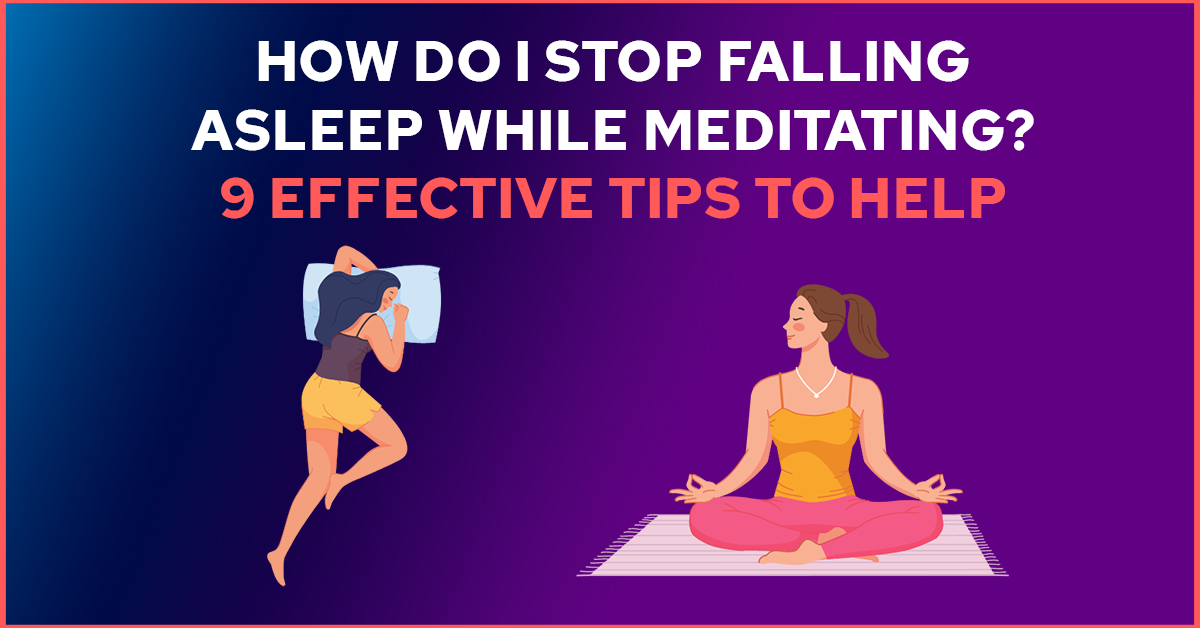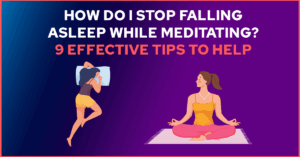How to Stop Falling Asleep While Meditating: 9 Effective Tips

Have you ever tried to meditate and ended up snoozing instead? Falling asleep while trying to meditate is a common hiccup. This article will give you nine tips to keep your eyes open and stay present during your meditation session.
Get ready to conquer sleepiness!
Key Takeaways
- Meditating in bed or when tired makes it easy to fall asleep. Try sitting up and not right after you eat a big meal.
- Keep your meditation space different from where you sleep, like a chair or outside, to help stay awake.
- Short meditations can work well. Aim for about 12 – 13 minutes so you don’t get too sleepy.
- Drinking water before meditating keeps your mind clear. Also, fresh air helps keep you alert.
- If sitting still is hard, try walking meditation or moving like yoga to stay awake.
Understand Why Falling Asleep During Meditation Happens

So, you keep dozing off while trying to meditate? Don’t worry; it’s a common thing. This happens because your parasympathetic nervous system kicks in during meditation. Think of this part of your nervous system like a calm-down button for your body.
It helps you relax so much that you may start feeling sleepy or even fall asleep.
Also, meditating can make your brain act like it does when you’re sleeping. This doesn’t mean you’re not doing it right. In fact, feeling sleepy could be a sign that meditation is working well for you! The trick is finding ways to stay awake so that you can enjoy the relaxation without missing out by taking an unplanned nap.
The Difference Between Deep Meditation and Falling Asleep

Deep meditation and falling asleep might seem similar because both can feel relaxing. But, they’re not the same thing at all! In deep meditation, your mind is very active. You’re aware of thoughts floating by but you don’t hold onto them.
It’s like sitting beside a river watching leaves drift past. Your body feels rested, sure, but your brain waves are buzzing with a kind of alertness unique to meditation.
Falling asleep drops you into a completely different state where awareness checks out. Dreams take over and those brain waves that were once buzzing slow way down. Think about it as hopping on a dream train heading to Sleepy Town, leaving Wakeful City behind without looking back.
During sleep, our bodies repair themselves in ways meditation doesn’t touch on—like muscle growth and memory consolidation (that’s science-speak for locking in new learnings). So yeah, meditating isn’t just snooze time; it’s when your consciousness gets to stretch its legs while still staying put right inside your head.
Is Falling Asleep During Meditation Really That Bad?

Falling asleep while meditating happens to many people. It’s often because you’re tired. Sitting in bed or lying down makes it easier to doze off. So, finding a different spot and sitting up might help keep you awake.
Short meditations are good for starters. They last about three minutes and it’s tough to fall asleep that fast.
Many folks worry if sleeping during meditation is bad. Well, it’s not the end of the world. Your body takes what it needs — sometimes, that’s rest over deep thought time. But if staying awake is your goal, there are ways to fight drowsiness and keep your mind alert.
Moving around or splashing cold water on your face can wake you up quickly so you can focus better next time you sit down to practice mindfulness.
Effective Tips to Stay Awake During Meditation

Staying awake while you sit and clear your mind shouldn’t feel like a fight. Yet, many of us nod off the second we try to meditate. Keeping your eyes from falling shut can be as simple as tweaking where and how you practice.
Forget about cozying up in bed or lying down if you don’t want to drift off. And adding a bit of movement or fresh air into the mix might just do the trick.
Ensure Adequate Night’s Sleep

Getting enough sleep at night is key if you want to stay awake while meditating. Think about it: your body needs rest to function well during the day. If you’re always tired or don’t get enough shut-eye, chances are high you’ll start dozing off the moment you try to quiet your mind and meditate.
Make sure your sleep schedule isn’t playing tricks on you—aim for 7-9 hours of good quality sleep every night.
Sleeping well makes a huge difference in everything, including meditation. It’s like giving your brain a full charge before asking it to focus and be present. By hitting the hay early and ensuring those zzz’s are top-notch, not only will your meditation sessions feel more invigorating, but all parts of your day will too.
So, yes, catching adequate winks is directly linked with how alert you can stay during meditation time; consider it a foundational step in mastering the art of staying awake while delving into mindfulness or any other form of meditative practice.
Separate Sleep and Wake Time

Keep your sleep and awake moments apart. It’s like telling your body, “Hey, it’s time to chill” or “Okay, wakey-wakey!” Your brain gets the hint. This trick stops you from snoozing off while trying to meditate.
Think about it – if every night at 9 PM you’re scrolling on your phone in bed, then try to meditate in that same spot the next morning. Well, guess who’s more likely to fall back asleep? Yep.
So, find a cozy corner for meditation that’s not your sleeping area.
Next up: don’t even think about hopping into bed or lying down when it’s time to focus and clear your mind.
Avoid Meditating in Bed

Meditating in bed might seem cozy, but it’s tricky. Your brain starts to mix up sleep time and wake time. Think about this: you’re trying to stay awake while surrounded by pillows and blankets.
Sounds tough, right? The comfort of your bed makes it hard to keep that sharp focus needed during meditation.
So, find a spot that’s not for sleeping. Maybe a comfy chair or a cushion on the floor. This way, your mind knows it’s not nap time—it’s meditate time! Now onto avoiding lying down while you meditate.
Avoid Lying Down While Meditating

So, you’re not going to meditate in bed. That’s a good start. Next up, don’t lie down at all while you try to stay awake and focus. Lying down might feel cozy, but it sends your brain the wrong signal – nap time! And we don’t want that.
Here’s the thing: if you keep yourself upright, your chances of staying alert shoot up. Think about sitting on a chair or cross-legged on a cushion – these are your best bets. They help your body know it’s time to meditate, not sleep.
Plus, this position keeps your spine straight and supports better breathing during meditation practice. So yes, ditch the comfort of lying down if falling asleep is making meditation tricky for you.
Meditate in a Fresh Air Environment

Find a spot outside where the air moves freely. This place can be your garden, a quiet park, or even just near an open window. Fresh air makes it easier for you to stay awake while you practice meditation.
It’s not as cozy and warm as indoors, which keeps your mind alert. Think about it: when you breathe in that crisp air, your body feels more alive.
Make sure the location isn’t too bright or noisy. You want the natural light from the sun but not directly in your eyes. And while some background sounds of nature are calming, loud noises can distract you.
Keeping lights on if you’re inside also helps signal to your brain that it’s time to be awake and focused, not sleep time.
Stay Hydrated

Drinking enough liquid keeps you awake while you meditate. It’s true! If you feel sleepy, maybe you’re not drinking enough water. Water helps keep your mind clear and ready for meditation.
Try having a glass of H2O before you start. This simple step can kick drowsiness to the curb.
Keeping your body well-watered creates a wakeful state that fights off tiredness during meditation. So, make sure to sip some water throughout the day, not just right before meditation time.
This habit helps your brain stay sharp and focused, making it easier to stay awake as you meditate.
Avoid Meditating After a Large Meal

Eating a big meal before you sit down to meditate can be a bad idea. It makes you feel sleepy and messes with your focus. Your body works hard to digest all that food, pulling blood away from your brain.
This can leave you feeling drowsy and less able to keep your mind clear.
So, try having a light snack instead if you’re hungry before meditation time. Foods like fruits or nuts are good choices. They give you energy without making your stomach too full.
Keeping meals small before meditation helps ensure that the only thing drifting off is stress—not you!
Try Walking or Movement Meditation

You might get bored or sleepy sitting still while you meditate. So, why not try walking meditation? It keeps your body moving and your mind alert. You walk slowly and pay attention to your steps.
Feel the ground under your feet and listen to sounds around you. This can be great in a park or even in a quiet room.
Another cool option is yoga or tai chi. These are like slow dances that help you stay awake. Your breath guides these movements, which helps keep both body and mind busy but calm. Doing this instead of sitting can make a big difference if you often drift off during meditation sessions.
Keep Meditation Sessions Brief

Meditation sessions don’t have to be long to work. Studies show that short, frequent practices can really boost your attention, memory, and mood. Keeping it around 12-13 minutes is a sweet spot.
It’s enough time to relax deeply but not so long that you start nodding off. This way, meditation becomes a part of your daily routine rather than something you keep falling asleep during.
Trying shorter sessions might also make it easier for you to stay awake and focused. Plus, this approach fits well into busy schedules—you can find small pockets of time without feeling overwhelmed.
Next up, exploring different ways to stay even more alert could be just what you need!
Exploring Other Methods to Enhance Alertness

So, you’ve tried all the basics but still catch yourself nodding off? It’s time to jazz things up a bit with some fresh tricks. Keeping your peepers open can do wonders, and who knew stepping outside before lunch could make such a difference?
Keep Eyes Open During Meditation

Keeping your peepers open while you meditate might feel a bit odd at first. You’re used to shutting everything out, right? Eyes open keeps you in the now, making it tougher to drift off to dreamland.
It’s like having a little anchor that ties you down to being awake. Picture yourself sitting there, taking in the room with a soft gaze. Not staring hard at anything, just gently looking ahead helps your brain stay active and alert.
This trick is simple but powerful for those who constantly fight the snooze during meditation time. Meditation experts often suggest this method when sleepiness hits hard because it works wonders! So next time you’re settling into that quiet moment, resist closing those eyes too soon.
Let them stay partly open and see how this small change makes a big difference in keeping you focused and engaged.
Meditate Before Meals

Meditating on an empty stomach keeps you alert. It’s like going for a walk or doing stretches before eating. Your body is light, and your mind stays sharp. This practice gets your brain waves active, making it less likely for you to nod off.
Imagine sitting down to meditate with nothing in your belly; your focus might just be a bit sharper.
Eating big meals can make you sleepy—think of how sluggish you feel after a huge lunch. By choosing to sit and clear your mind before grabbing that sandwich or salad, the chances of staying awake increase massively.
Got meditation scheduled? Try doing it before breakfast or lunch. This way, not only does meditating become easier, but meals might even taste better after!
Try Meditating Outdoors

Going outside to meditate can do wonders for keeping you awake. The fresh air, the sound of birds, and the warmth of sunlight help keep your mind alert. It’s a simple change, but it makes a big difference.
You find yourself more connected to the now and less likely to drift off.
Taking your meditation practice into nature has another perk—energy from the environment boosts your focus. Whether it’s in your backyard or a local park, picking a spot where you feel comfortable yet invigorated is key.
This method enhances your attention and ensures that drowsiness doesn’t win.
Use a Meditation Bench

Using a meditation stool makes it easier to stay awake and focused. This tool supports your body in a way that keeps you alert. Good posture is key for not falling asleep, and these stools help with that.
They lift your hips higher than your knees, which lets you sit comfortably without getting drowsy. Plus, they’re designed to make sure you don’t feel pain while sitting for long times.
Meditation stools create a clear line between sleeping and meditating too. When you use one, it’s like telling your brain, “Hey, this time is for staying awake.” This helps lower the chance of dozing off.
With better focus and less discomfort thanks to the stool’s smart design, meditating becomes more effective. It keeps your mind sharp and prevents slipping into sleepiness.
Follow Guided Meditation Sessions
After sitting on a meditation stool, jumping into guided meditations is a smart move. These sessions lead the way, so you’re less likely to nod off. Think of it like having a friend who keeps the conversation going—you stay tuned in.
Guided meditation comes in many forms—apps, online videos, or audio tracks—and they all do an amazing job at keeping your mind engaged. Swami Purnachaitanya and others offer practical tips within these sessions to help fight the z’s during your practice.
So next time you settle in for some mindfulness time, consider letting someone guide you through it. Not only does this keep things interesting, but following along can also sharpen your focus and alertness without slipping into dreamland.
Conclusion

So, you want to stay awake while sitting still and breathing deep? We’ve got you covered. Try out these tips next time your eyelids get heavy. Simple things can make a big difference—like not lying down or choosing the right time of day.
If that doesn’t work, open your eyes wide or take your meditation on a walk. Remember, it’s all about finding what clicks for you. Staying focused and feeling fresh during your quiet moments is totally doable with a bit of tweaking here and there.
Keep trying until you find your sweet spot!
FAQs
1. Why do I keep falling asleep while meditating?
Ah, the age-old question… “Why do I keep nodding off when I’m trying to find my zen?” Well, it’s not just you! Falling asleep during meditation is pretty common. It’s like your brain decides it’s nap time as soon as you’re still and quiet. Meditation relaxes you, and if you’re tired or sleep-deprived (thanks, modern life!), snooze-ville is a likely stop.
2. Is it really bad to fall asleep during meditation?
Here’s the scoop: falling asleep isn’t the end of the world. Sometimes, it means your body needs rest—so take that power nap as a bonus! But if you’re aiming for mindfulness or working on your cognitive function, staying awake is key. Think of it this way; if meditation were a movie, sleeping through it means missing all the good parts!
3. How can I stay awake while meditating without feeling like a zombie?
Okay, picture this: You’re sitting there trying to meditate and not drift off… again. Want some tricks? Try splashing cold water on your face before starting (old but gold), sit in a less comfy position (sorry, couch), or even try open-eye meditation—yes, that’s a thing! These little tweaks can help keep those zzz’s at bay.
4. What are some times of day when I’m less likely to fall asleep while meditating?
Timing is everything! Meditating right after waking up or during lunch break might boost your chances of staying awake compared to right before bed when you’re already in sleepy mode. Experiment with different times; who knows? A quick walk around the block before sitting down might just be what keeps those eyelids from drooping.
5. Can changing my diet or daily routine help me stay alert during meditation?
You betcha! What we eat and how we spend our day can totally affect our meditation game. Feeling relaxed yet alert is the goal here—so maybe skip that heavy meal right before meditating and opt for something light instead? And hey, incorporating more movement throughout your day could also give you an edge in beating drowsiness.
6. Are there any tools or gadgets that could help me not fall asleep while meditating?
In today’s tech-savvy world… absolutely! From meditation benches designed to keep you upright (and conscious) to apps reminding us not to slouch into dreamland—the options are endless.











